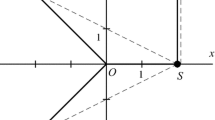Abstract
In coalitional games in which the players are partitioned into groups, we study the incentives of the members of a group to leave it and become singletons. In this context, we model a non-cooperative mechanism in which each player has to decide whether to stay in her group or to exit and act as a singleton. We show that players, acting myopically, always reach a Nash equilibrium.



Similar content being viewed by others
Notes
European People’s Party (Christian Democrats) and European Democrats.
We use the term mechanism instead of non-cooperative game to avoid confusion with coalitional games.
For simplicity, we write {123|45|6} instead of {{1,2,3},{4,5},{6}}, and so on.
We thank María Montero for proposing this example.
We write 146 instead of {1,4,6}, and so on.
A game v is monotonic if v(S)≤v(T) for all S⊆T, and superadditive if v(S)+v(T)≤v(S∪T) for all S,T with S∩T=∅.
References
Albizuri MJ, Zarzuelo JM (2004) On coalitional semivalues. Games Econ Behav 49:221–243
Albizuri MJ, Aurrekoetxea J, Zarzuelo JM (2006) Configuration values: extensions of the coalitional Owen value. Games Econ Behav 57:1–17
Arin J, Felktamp V, Montero M (2012) Coalitional games with veto players: myopic and rational behavior. CeDEx discussion paper No 2012-11
Aumann RJ, Myerson R (1988) Endogenous formation of links between players and coalitions: an application of the Shapley value. In: Roth AE (ed) Essays in honor of Lloyds S Shapley. Cambridge University Press, Cambridge
Bergantiños G, Vidal-Puga J (2005) The consistent coalitional value. Math Oper Res 30(4):832–851
Bergantiños G, Casas B, Fiestras-Janeiro G, Vidal-Puga J (2007) A focal-point solution for bargaining problems with coalition structure. Math Soc Sci 54(1):35–58
Bloch F (1996) Sequential formation of coalitions in games with externalities and fixed payoff division. Games Econ Behav 14:90–123
Calvo E, Lasaga J, Winter E (1996) The principle of balanced contributions and hierarchies of cooperation. Math Soc Sci 31:171–182
Carreras F, Owen G (1988) Evaluation of the Catalonian parliament 1980–1984. Math Soc Sci 15:87–92
Carreras F, Owen G (1996) An analysis of the Euskarian parliament. In: Schofield N, Milford A (eds) Collective decision-making: social choice and political economy. Kluwer, Dordrecht
Chae S, Heidhues P (2004) A group bargaining solution. Math Soc Sci 48(1):37–53
Chae S, Moulin H (2010) Bargaining among groups: an axiomatic viewpoint. Int J Game Theory 39(1–2):71–88
Chatterjee K, Dutta B, Ray D, Sengupta K (1993) A noncooperative theory of coalitional bargaining. Rev Econ Stud 60:463–477
d’Aspremont C, Gabszewicz JJ, Jacquemin A, Weymark JA (1983) On the stability of collusive price leadership. Can J Econ 16(1):17–25
Fragnelli V, Iandolino A (2004) A cost allocation problem in urban solid wastes collection and disposal. Math Methods Oper Res 59:447–463
Gómez-Rúa M, Vidal-Puga J (2010) The axiomatic approach to three values in games with coalition structure. Eur J Oper Res 207(2):795–806
Hamiache G (1999) A new axiomatization of the Owen value for games with coalition structures. Math Soc Sci 37:281–305
Hamiache G (2001) The Owen value values friendship. Int J Game Theory 29:517–532
Harsanyi JC (1959) A bargaining model for the cooperative n-person game. In: Tucker, Luce (eds) Contributions to the theory of games IV. Princeton University Press, Princeton, pp 325–355
Harsanyi JC (1977) Rational behavior and bargaining equilibrium in games and social situations. Cambridge University Press, Cambridge
Hart S, Kurz M (1983) Endogenous formation of coalitions. Econometrica 51(4):1047–1064
Hart S, Kurz M (1984) Stable coalition structures. In: Holler MJ (ed) Coalitions and collective action. Physica, Würzburg, pp 235–258
Krasa S, Temimi A, Yannelis NC (2003) Coalition structure values in differential information economies: is unity a strength? J Math Econ 39:51–62
Monderer D, Shapley L (1996) Potential games. Games Econ Behav 14:124–143
Myerson RB (1977) Graphs and cooperation in games. Math Oper Res 2:225–229
Okada A (1996) A noncooperative coalitional bargaining game with random proposers. Games Econ Behav 16:97–108
Ono R, Muto S (2001) Coalition cabinets in Japan (1993–1997): a game theory analysis. Int Game Theory Rev 2&3(3):113–125
Owen G (1977) Values of games with a priori unions. In: Henn R, Moeschlin O (eds) Essays in mathematical economics and game theory. Springer, Berlin, pp 76–88
Owen G (1995) Game theory, 3rd edn. Academic Press, New York. First edition in 1968, second edition in 1982
Peleg B, Sudhölter P (2003) Introduction to the theory of cooperative games. Kluwer Academic, Dordrecht
Sánchez E, Bergantiños G (1999) Coalitional values and generalized characteristic functions. Math Methods Oper Res 49:413–433
Thoron S (1998) Formation of a coalition-proof stable cartel. Can J Econ 31(1):63–76
Vázquez-Brage M, García-Jurado I, Carreras F (1996) The Owen value applied to games with graph-restricted communication. Games Econ Behav 12:42–53
Vázquez-Brage M, Van den Nouweland A, García-Jurado I (1997) Owen’s coalitional value and aircraft landing fees. Math Soc Sci 34:273–286
Vidal-Puga J (2005) A bargaining approach to the Owen value and the Nash solution with coalition structure. Econ Theory 25(3):679–701
Vidal-Puga J (2012) The Harsanyi paradox and the “right to talk” in bargaining among coalitions. Math Soc Sci 64(3):214–224
Vidal-Puga J, Bergantiños G (2003) An implementation of the Owen value. Games Econ Behav 44:412–427
Winter E (1989) A value for cooperative games with level structure of cooperation. Int J Game Theory 18:227–240
Winter E (1991) On non-transferable utility games with coalition structure. Int J Game Theory 20:53–63
Winter E (1992) The consistency and potential for values of games with coalition structure. Games Econ Behav 4:132–144
Acknowledgements
A previous version of this paper, titled “Negotiating the membership,” has benefited from helpful comment from Francesc Carreras. Financial support by the Spanish Ministerio de Ciencia e Innovación through grant ECO2011-23460 and the Xunta de Galicia through grant 10PXIB362299PR is gratefully acknowledged.
Author information
Authors and Affiliations
Corresponding author
Rights and permissions
About this article
Cite this article
Gómez-Rúa, M., Vidal-Puga, J. Bargaining and membership. TOP 22, 800–814 (2014). https://doi.org/10.1007/s11750-013-0301-0
Received:
Accepted:
Published:
Issue Date:
DOI: https://doi.org/10.1007/s11750-013-0301-0



